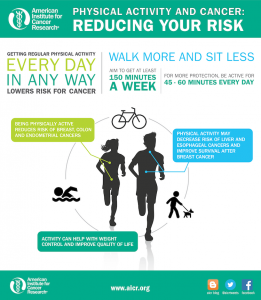From reducing the risk of developing cancer to reducing side effects from cancer treatment, research shows the benefits of exercise across the cancer continuum. Even after completion of treatment, exercise can aid in improving and restoring health into survivorship. AICR has funded several studies looking into the role of exercise during breast cancer treatment and survivorship.
For breast cancer awareness month, clinical dietitian and specialist in oncology nutrition, Angela Hummel, writes about the advice she gives to her patients about physical activity and its impact on breast cancer.
How does physical activity impact breast cancer?
AICR recommends being physically active as a part of everyday life for reducing the risk of pre-and post-menopausal breast cancer. Observational studies – studies where researchers observe the effect of a risk factor – have demonstrated that physically active women are at lower risk of developing breast cancer. Studies suggest a 20% reduction in breast cancer risk when comparing women who exercised the most compared to women who exercised the least (1).
Engaging in physical activity has been linked to better cancer outcome for those diagnosed with breast cancer. Those who engaged in the highest levels of physical activity after diagnosis had a 29% lower risk of dying from breast cancer and a 43% lower risk of dying from another health-related cause (2). In animal studies, exercise reduced breast tumor formation and slowed tumor growth. More promising research is coming. Last month, the first published study conducted in women who had breast cancer found that exercise had a direct effect on breast tumors (3).

Why is physical activity decreasing breast cancer risk and improving outcomes?
Cancer is complicated and it is not clear how physical activity is making an impact on breast cancer risk and outcome. Researchers have been focusing on metabolic, inflammatory and immune pathways that are stimulated by physical activity. This area of research is growing and will help provide answers and direct future research.
How do you incorporate physical activity into your lifestyle?
Begin by changing your mindset from “I’m too tired” or “I don’t have time” to “I’m doing this to improve my health,” “I feel great after I exercise,” and “I want to do all I can to improve the outcome of my diagnosis.”
Start where you are. If you are currently exercising, increase the duration and/or intensity over a manageable period of time. Determine how many minutes or steps you are moving per day by logging or keeping a journal. The recommendation is to aim for 150 minutes of moderate (able to talk but not sing) or 75 minutes of vigorous (not able to talk) physical activity per week. Add 5-10 minutes per week until you are reaching 45 or more minutes per day. Going beyond 60 minutes per day can provide additional health benefits. If you have already reached 60+ minutes per day then increase the pace from light (able to sing while exercising) to moderate or from moderate to vigorous, if safely able to do so.
If you are currently undergoing cancer treatment, talk with your health-care team about any concerns with exercising. Ask for guidance or potential limitations around fatigue, lymphedema or mental fog. Engaging in physical activity throughout the period of time of receiving treatment can reduce cancer-related fatigue, depression, mood and help with weight management, and improve appetite, cognition and cancer outcome.
Blueprint to Beat Breast Cancer
Sources:
1. Neilson HK, Farris MS, Stone CR, et al. Moderate-vigorous recreational physical activity and breast cancer risk, stratified by menopause status: a systematic review and meta-analysis. Menopause. 2017;24:322-44.
2. Zhong S, Jiang T, Ma T, et al. Association between physical activity and mortality in breast cancer: a meta-analysis of cohort studies. Eur J Epidemiol. 2014;29:391-404.
3. Ligibel JA, Dillon D., Giobbie-Hurder A, et al. Impact of a pre-operative exercise intervention on breast cancer proliferation and gene expression: results from the pre-operative health and body (PreHAB) study. Clinical Cancer Research. 2019;25(17).





